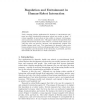Free Online Productivity Tools
i2Speak
i2Symbol
i2OCR
iTex2Img
iWeb2Print
iWeb2Shot
i2Type
iPdf2Split
iPdf2Merge
i2Bopomofo
i2Arabic
i2Style
i2Image
i2PDF
iLatex2Rtf
Sci2ools
109
click to vote
ISER
2000
Springer
2000
Springer
Regulation and Entrainment in Human-Robot Interaction
: Newly emerging robotics applications for domestic or entertainment purposes are slowly introducing autonomous robots into society at large. A critical capability of such robots is their ability to interact with humans, and in particular, untrained users. This paper explores the hypothesis that people will intuitively interact with robots in a natural social manner provided the robot can perceive, interpret, and appropriately respond with familiar human social cues. Two experiments are presented where naive human subjects interact with an anthropomorphic robot. Evidence for mutual regulation and entrainment of the interaction is presented, and how this benefits the interaction as a whole is discussed.
Autonomous Robots | Human Social Cues | ISER 2000 | Robot | Robotics |
| Added | 25 Aug 2010 |
| Updated | 25 Aug 2010 |
| Type | Conference |
| Year | 2000 |
| Where | ISER |
| Authors | Cynthia Breazeal |
Comments (0)

